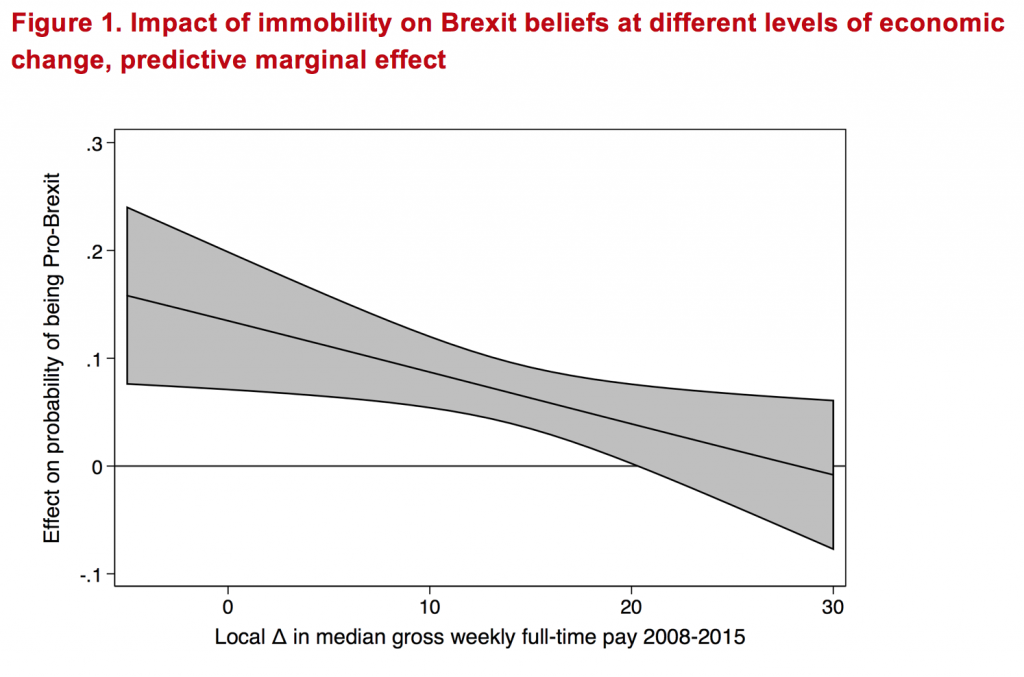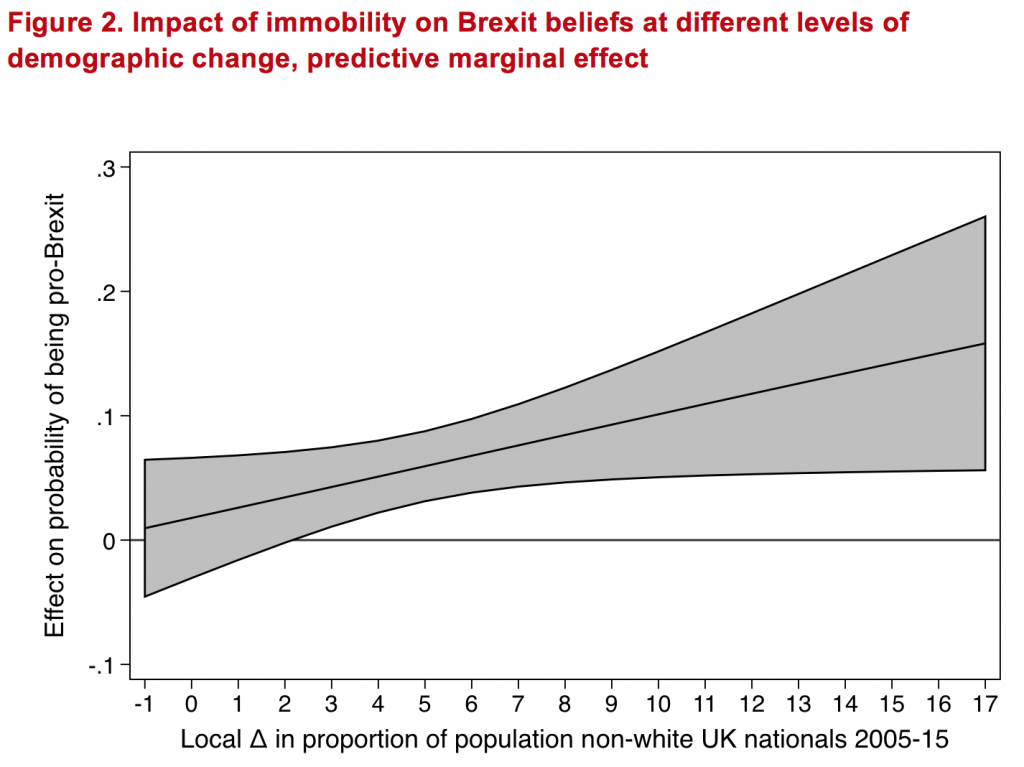Immobility and support for Leave: Brexit was partly a reaction to change from the locally rooted
Popular explanations of the Brexit vote have centred on the division between cosmopolitan internationalists who voted Remain, and geographically-rooted individuals who voted Leave. Katy Morris, Neil Lee, and Thomas Kemeny write that residential immobility also matters. They explain why those living in their county of birth were more likely to support Leave. However, the impact of immobility was filtered by local circumstances: immobility only mattered for respondents living in areas experiencing relative economic decline or increases in migrant populations.
#LondonStays Brexit protests, 2016 by Ed Everett via a CC BY 2.0 licence
One of the most popular explanations of the Brexit vote to emerge in 2017 centred on the division between two apparently distinct British tribes: Somewheres and Anywheres. In his best-selling book The Road to Somewhere, David Goodhart draws on a longer tradition of scholarship on localism and cosmopolitanism to identify two economically and culturally dissimilar groups within British society: locally-oriented, geographically-rooted Somewheres who voted to leave the European Union, and mobile, internationally-oriented Anywheres who voted to remain within the EU.
The notion of geographical mobility (or the absence thereof) lies at the heart of this apparent social and political cleavage. In Goodhart’s framework, Somewheres are defined through their rootedness in place, with strong attachments to the specifics of their local area and identities that are formed through local associations. By contrast, Anywheres are defined partly by their mobility. Such mobility, which typically occurs through attending university and/or obtaining professional work some distance away from the place of birth, contributes to the development of what Goodhart describes as ‘portable “achieved identities”’ which tend to be internationally rather than locally oriented. Yet in this framework it is not clear whether mobility is a cause or a consequence of certain political values and dispositions.
In a new paper, we use early release data from Understanding Society, the largest longitudinal survey of UK households, to explore whether residential immobility was an important variable in the Brexit vote. Understanding Society offers rich individual-level data on respondents’ county of birth, demographic characteristics, highest level of educational attainment, psychological values and cognitive ability. In Wave 8 of the survey, Understanding Society respondents were also asked the same question that was posed in the 2016 EU Referendum: “Should the United Kingdom remain a member of the European Union or leave the European Union?”.
We use these data to explore two important issues that have not been addressed by the growing body of research on the determinants of EU Referendum voting patterns or the wider literature on populist voting. First, we investigate whether immobile respondents, defined as those living in the same county in which they were born during 2016, were more likely to support Brexit than respondents who have moved away, holding constant other factors that might affect the likelihood of having moved away.
We then investigate whether the effects of residential immobility on support for Brexit depend on recent change in local economic performance or inward migration, recognising that there can be positive and negative selection into immobility. We conceive of two ideal types of placebound individuals, those that choose to remain fixed in place because things are going well in their local area, and those who feel trapped and unable to move away from places experiencing rapid change.
Contrary to the implicit assumptions of much academic research, immobility is the majority experience among the British electorate. In our sample, 55% of respondents were living in the same county in which they were born in 2016. And immobility does appear to exert an independent influence on support for Brexit. Controlling for a host of potential mechanisms through which immobility might influence support for Brexit (including educational attainment, psychology, and personal values), we find that those who were living in their county of birth in 2016 are around 7% more likely to state that the United Kingdom should leave the European Union.
Yet our findings are only partly about immobility per se. We also find that the effect of immobility on support for Brexit is modified by recent local change in terms of wage growth and increases in the non-white British population: immobility only matters in places where wages have been growing slowly or where recent growth in the non-white British population exceeds 2 percentage points. This can be seen in Figures 1 and 2 which graphically present the impact of immobility on the probability of being pro-Brexit at different levels of change in local wages and population composition. What these figures show is that it is the combination of immobile people and the characteristics of the places that they have remained immobile in that appear to shape support for Brexit.
 Note: Each model presents the predicted marginal effect of the impact of immobility (defined as living in county of birth) at different levels of local changes in wages on belief that Britain should leave the European Union. 95% Confidence intervals given by shaded area. Models specified as in table 5, with controls for Gender, 5 Ethnic Categories, Age, Age2, whether sampled before Brexit, labour force status (employed, retired, student, unemployed, inactive), education, life satisfaction, income satisfaction, cognitive testing, the Big 5 personality traits and values.
Note: Each model presents the predicted marginal effect of the impact of immobility (defined as living in county of birth) at different levels of local changes in wages on belief that Britain should leave the European Union. 95% Confidence intervals given by shaded area. Models specified as in table 5, with controls for Gender, 5 Ethnic Categories, Age, Age2, whether sampled before Brexit, labour force status (employed, retired, student, unemployed, inactive), education, life satisfaction, income satisfaction, cognitive testing, the Big 5 personality traits and values.
 Note: Each model presents the predicted marginal effect of the impact of immobility (defined as living in county of birth) at different levels of local changes in non-White population on belief that Britain should leave the European Union. 95% Confidence intervals given by shaded area. Models specified as in table 5, with controls for Gender, 5 Ethnic Categories, Age, Age2, whether sampled before Brexit, labour force status (employed, retired, student, unemployed, inactive), education, life satisfaction, income satisfaction, cognitive testing, the Big 5 personality traits and values.
Note: Each model presents the predicted marginal effect of the impact of immobility (defined as living in county of birth) at different levels of local changes in non-White population on belief that Britain should leave the European Union. 95% Confidence intervals given by shaded area. Models specified as in table 5, with controls for Gender, 5 Ethnic Categories, Age, Age2, whether sampled before Brexit, labour force status (employed, retired, student, unemployed, inactive), education, life satisfaction, income satisfaction, cognitive testing, the Big 5 personality traits and values.
We do not wish to overstate our results: immobility was just one factor in the vote, others such as educational attainment were more important, and we are unable to fully tease out the complex linkages between mobility, individual psychology and values, and populist voting. Yet it is clear that immobility and in particular the combination of immobility and certain types of local change created an important set of circumstances that help explain the EU Referendum outcome. Had more of the British electorate moved away from the place they were born in; had the places in which immobile people have stayed in fared better economically under processes of globalisation; or had these places remained more stable in terms of demographic composition, then the EU Referendum outcome may have been different.
________
Note: this draws on the authors’ published work in the Cambridge Journal of Regions, Economy and Society. This post represents the views of the author and not those of Democratic Audit. It was originally posted on the LSE British Politics and Policy blog.
 Katy Morris is a Phd Candidate at the European University Institute.
Katy Morris is a Phd Candidate at the European University Institute.
 Neil Lee is an Associate Professor in Economic Geography in the Department of Geography and Environment, London School of Economics.
Neil Lee is an Associate Professor in Economic Geography in the Department of Geography and Environment, London School of Economics.
 Tom Kemeny is a Senior Lecturer in Economic Development in the School of Business and Management, Queen Mary, University of London.
Tom Kemeny is a Senior Lecturer in Economic Development in the School of Business and Management, Queen Mary, University of London.






 Democratic Audit's core funding is provided by the Joseph Rowntree Charitable Trust. Additional funding is provided by the London School of Economics.
Democratic Audit's core funding is provided by the Joseph Rowntree Charitable Trust. Additional funding is provided by the London School of Economics.